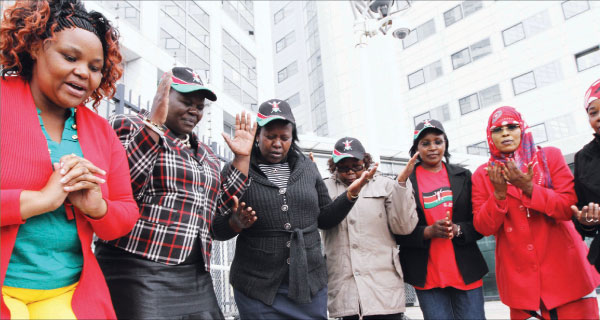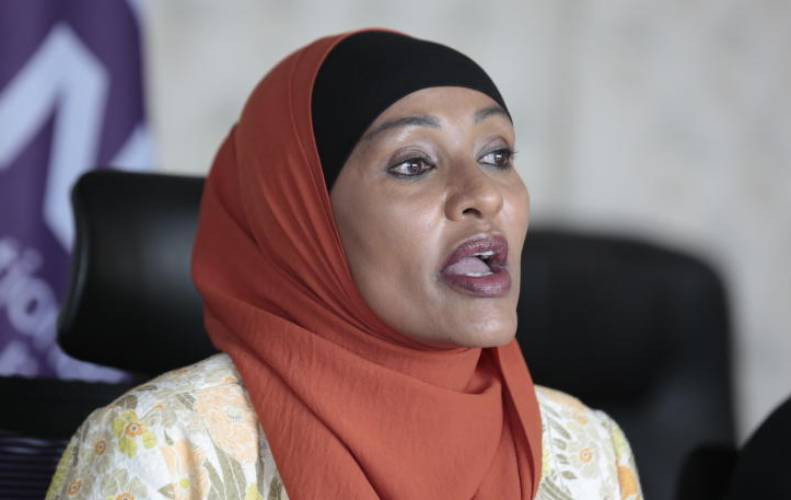By Stephen Makabila
KENYA: The National Gender and Equality Commission now wants Parliament to fast-track establishment of a legal framework to anchor gender equality and representation in law as envisaged in Art. 27(8) of the Constitution.
This latest call by the commission chairperson Winfred Lichuma comes at a time the Commission feels recent appointments of parastatal chairpersons went against the gender and inclusion principles as envisaged in the Constitution.
“Article 27(8) of the Kenya Constitution 2010 obligates the State to implement the principle that not more than two-thirds of the members of elective or appointive bodies shall be of the same gender. A quick analysis of the appointments fails to meet the cardinal rule of diversity,” notes Lichuma.
Bungoma County Women Representative Reginalda Wanyonyi, says its upon elected women leaders to lead from the front in pushing for the legal framework.
“I call upon my colleagues in the House to take-up this challenge in 2014 and ensure we are within the 2015 deadline of having this framework in place,” Dr Wanyonyi told The Standard on Sunday.
The formula of realising the framework has remained elusive and despite several meetings organised by the government ahead of the March 4 General Election, not much was realised.
Recognised
And even as the Commission makes fresh demands to Parliament in a bid to strengthen women participation in leadership, scholars have raised the red flag over non-recognition of women in the country’s freedom struggle and post-independence leadership.
And this raises the question, to what extend did women contribute to Kenya’s freedom from the British colonialists?
Historians who had converged at Karatina University for an international conference on Mau Mau and other liberation movements around the world recently, resolved women’s role in the struggle of Kenya’s freedom be officially recognised by the government.
So serious were arguments on this subject that it formed part of the resolutions after the two-day conference sponsored by the university and the National Museums of Kenya.
“There is need to give more recognition to the contribution of women in the liberation as the focus so far has been on men. There is need to provide more literature on the role of women in the struggle for liberation of this country,” read the resolution delivered by the Dean, School of Education and Social Sciences at Karatina University John Mwaruvie.
Among those who addressed the conference included Havard University history professor, Caroline Elkins and United States International University-Kenya’s Prof Munene Macharia.
The conference sought to demystify Mau Mau and other liberation movements, examine the role of Mau Mau as nationalist movement and undertake a comparative analysis of liberation movements in the world.
Stay informed. Subscribe to our newsletter
Prof Catherine Ndungo, the Director Institute of African Studies at Kenyatta university and Dr Timothy Njoora of the Department of Music at the same university, in their joint Paper titled “The un-sung Heroines: Women’s role in the Mau Mau Liberation Struggle,” best captured the level at which women freedom fighters had been ignored.
Unsung heroes
“Despite the fact that men and women were involved in the struggle, little has been written about women’s role in the struggle. They have remained unsung warriors. They were fighters that no one talks about. They ensured people in the forest were fed, the injured nursed, and supply lines remained open for the warriors to remain motivated and informed,” the duo argued.
The paper says there is need to correct the misinformation that has been perpetuated that the Mau Mau war was a male affair.
Mr Gilbert Nyakundi Okebiro of Mt Kenya University (Lodwar Campus), in his Paper titled “Gender Analysis in the Liberation Struggle in Kenya,” noted in the Mau Mau liberation struggle, there were active women such as Marshall Muthoni of Nyeri, Prophetess Moraa wa Ngiti of Kisii, Mekatilili wa Menza of Agiriama, Wambui Otieno and Priscillah Abwao.
Played key role
And Ms Muthoni Gachari, a senior lecturer at Daystar University, in her paper titled “The role of women in Kenya’s liberation struggle: The Literary Perspective,” notes the question of women’s role in liberation struggle in Africa and Kenya in particular has always been a crucial one.
Gachari called for correction of the wrong perspective given in history books, recognition of women liberation heroines and establishment of structures that directly address contribution of women in all aspects of Kenya’s development.
In his speech at the conference, the Secretary General of the Mau Mau War veterans association, Dr Gitu Wa Kahengeri mentioned Mekatilili (a woman) as one of the Mau Mau luminaries who deserve recognition.
And from the Mau Mau veterans, it has emerged that women in the Mau Mau movement played a key role in helping men hide from the British soldiers while some of them even fought along side the men.
Women fighting alongside the men was possible as the Mau Mau had a strict rule about rape. Rape was punishable by death.
Others brought food and weapons to the men in the forest and also let the men know what the British were doing. While they did this they managed to keep their farms going and raise their families.
The British on the other hand moved some villages into camps where women were beaten, harassed, raped, and forced into ‘communal labour’, where everyone had to work from 7am to 5pm. Curfew was at 6pm.
“At times women would hide the Mau Mau fighters in their homes. This was a dangerous thing to do for if they were caught they were sure to lose their lives and also put their families and even village at risk,” noted Kahengeri.
While the Mau Mau fighters rested in a home of a sympathiser, they were generally working on a plot to attack the British.
Sometimes they plotted to attack the post set up in the very village they were staying.
The women were clever enough to keep up the appearance of normal everyday life even though they may have been hiding Mau Mau fighters or even involved in a plot themselves.
These women were also able to save enough money to send some of their children to other countries for education.
They had them smuggled out of Kenya and into Europe with the hope that they would come back and help lead a free Kenya. Many of these children did come back.
And so women in their own rights, accomplished a lot for the freedom of Kenya, according to the historians.
 The Standard Group Plc is a
multi-media organization with investments in media platforms spanning newspaper
print operations, television, radio broadcasting, digital and online services. The
Standard Group is recognized as a leading multi-media house in Kenya with a key
influence in matters of national and international interest.
The Standard Group Plc is a
multi-media organization with investments in media platforms spanning newspaper
print operations, television, radio broadcasting, digital and online services. The
Standard Group is recognized as a leading multi-media house in Kenya with a key
influence in matters of national and international interest.
 The Standard Group Plc is a
multi-media organization with investments in media platforms spanning newspaper
print operations, television, radio broadcasting, digital and online services. The
Standard Group is recognized as a leading multi-media house in Kenya with a key
influence in matters of national and international interest.
The Standard Group Plc is a
multi-media organization with investments in media platforms spanning newspaper
print operations, television, radio broadcasting, digital and online services. The
Standard Group is recognized as a leading multi-media house in Kenya with a key
influence in matters of national and international interest.



